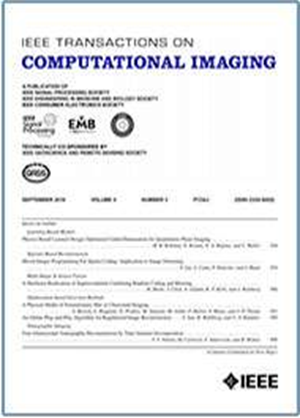基于鲁棒融合的高光谱图像超分辨率混合像素配准学习
IF 4.2
2区 计算机科学
Q2 ENGINEERING, ELECTRICAL & ELECTRONIC
引用次数: 0
摘要
超光谱图像(HSI)超分辨率(SR)的目的是在光谱和空间域生成高分辨率(HR)HSI,其中基于融合的 SR 方法通过同时利用观测到的低分辨率(LR)HSI 和 HR 多光谱图像(MSI)的优势,在生成令人满意的 HR HSI 方面显示出巨大的潜力。然而,大多数现有的基于融合的方法都隐含地假定观测到的低分辨率 HSI 和 HR MSI 是完全一致的,这在实际应用中很难做到,从而影响了它们在实际应用中的普适性能。为缓解这一问题,我们提出了基于融合的 HSI SR 混合像素配准学习框架,该框架具有两方面的优势。一方面,我们开发了一个像素配准模块(PRM)来直接估算每个像素的变换坐标,从而能够应对两个观测图像之间各种复杂的(如刚性或非刚性)错位,并可插入到任何其他现有架构中。另一方面,我们采用混合学习方案来共同学习 PRM 和基于深度图像先验的 SR 网络。通过将有监督学习和无监督学习以两阶段的方式结合在一起,所提出的方法能够利用图像无关性和图像特定性这两种特性来稳健地应对未知错位,从而提高泛化能力。在四个基准数据集上的实验结果表明,所提出的方法在处理各种未知错位的基于融合的 HSI SR 时性能优越。本文章由计算机程序翻译,如有差异,请以英文原文为准。
Hybrid Pixel-Wise Registration Learning for Robust Fusion-Based Hyperspectral Image Super-Resolution
Hyperspectral image (HSI) super-resolution (SR) aims to generate a high resolution (HR) HSI in both spectral and spatial domains, in which the fusion-based SR methods have shown great potential in producing a pleasing HR HSI by taking both advantages of the observed low-resolution (LR) HSI and HR multispectral image (MSI). Most existing fusion-based methods implicitly assume that the observed LR HSI and HR MSI are exactly registered, which is, however, difficult to comply with in practice and thus impedes their generalization performance in real applications. To mitigate this problem, we propose a hybrid pixel-wise registration learning framework for fusion-based HSI SR, which shows two aspects of advantages. On the one hand, a pixel-wise registration module (PRM) is developed to directly estimate the transformed coordinate of each pixel, which enables coping with various complex (e.g., rigid or nonrigid) misalignment between two observed images and is pluggable to any other existing architectures. On the other hand, a hybrid learning scheme is conducted to jointly learn both the PRM and the deep image prior-based SR network. Through compositing supervised and unsupervised learning in a two-stage manner, the proposed method is able to exploit both the image-agnostic and image-specific characteristics to robustly cope with unknown misalignment and thus improve the generalization capacity. Experimental results on four benchmark datasets show the superior performance of the proposed method in handling fusion-based HSI SR with various unknown misalignments.
求助全文
通过发布文献求助,成功后即可免费获取论文全文。
去求助
来源期刊

IEEE Transactions on Computational Imaging
Mathematics-Computational Mathematics
CiteScore
8.20
自引率
7.40%
发文量
59
期刊介绍:
The IEEE Transactions on Computational Imaging will publish articles where computation plays an integral role in the image formation process. Papers will cover all areas of computational imaging ranging from fundamental theoretical methods to the latest innovative computational imaging system designs. Topics of interest will include advanced algorithms and mathematical techniques, model-based data inversion, methods for image and signal recovery from sparse and incomplete data, techniques for non-traditional sensing of image data, methods for dynamic information acquisition and extraction from imaging sensors, software and hardware for efficient computation in imaging systems, and highly novel imaging system design.
 求助内容:
求助内容: 应助结果提醒方式:
应助结果提醒方式:


